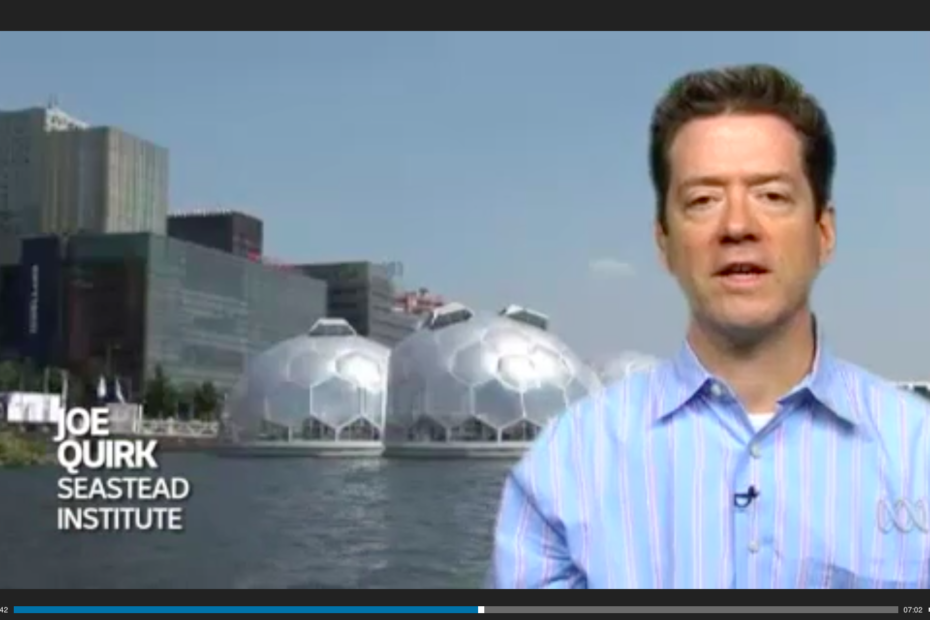[/video]
Originally from Lateline ABC Australia.
Transcript:
JOE QUIRK, SEASTEAD INSTITUTE: Seasteading is building politically independent cities that float on the ocean. Half the Earth’s surface is unclaimed by any government, so these would be start-up countries on the blue frontier.
Seasteaders bring a Silicon Valley sensibility to the problem of governments not innovating sufficiently. And if we provide the technology for thousands of people to start their own nano-nation on the high seas, we think innovations will emerge that will surprise the world. Innovators are held back and stymied by existing regulations, and we want to give them 21st century regulations on start-up governments. Once you provide people with a platform to start their own country, every conceivable type of innovator reaches out to you with their own idea. Algae farmers who want to absorb carbon from the ocean in order to feed the world. Medical researchers that want to push forward innovations to extend healthy life spans. Fish farmers reach out to us. We take no position on what kind of societies should be formed. We’re providing a technology for other people to try their version of societies.
As long as people can join them voluntarily and leave them voluntarily, and all the seasteads have to compete amongst each other to attract citizens voluntarily, we think the best solutions for governance will emerge.
Oil platforms are a technology for floating permanently on the high seas, and cruise ships are a technology for self-governance on the high seas. And if you combine these two technologies, imagine cruise ships that never dock, but float permanently. Imagine if they were 10 times as big. Imagine if they were modular and could move about and you could choose the neighbours you wanted to live with.
The Seasteading Institute signed a historic memorandum of understanding with the President of French Polynesia, and we’re going to start building two or three pilot platforms in the territorial waters of French Polynesia, with a special governing framework so people can experiment with new societies, and we’re going to use existing Dutch technology.
Our engineers at Blue 21, are an aquatic engineering firm who already built the floating pavilion in Rotterdam, and that’s going to be the prototype for our floating cities in French Polynesia.
French Polynesia is as big as Western Europe. So, we have lots of space to experiment with special economic zones. French Polynesia sees itself as the Blue Frontier. We’re going to draw a new map of the world, with French Polynesia as the centre of the Aquatic Age.
A lot of Pacific island nations are sinking below sea level. They could easily transition slowly into becoming floating nations. So there’s a natural, incremental step towards creating new nations on half the worlds’ surface which is unclaimed by any existing government.
What happens when babies are born there? We would petition the United Nations to recognise the sovereignty of these permanent, floating islands, and we think the United Nations is inclined to recognise floating nations.
A seastead can’t help you avoid taxes if you’re an American citizen. If you make 6 figures you, can’t avoid taxes, whether you move to a seastead or to Switzerland.
Seasteads cost money, and if you want to succeed as a seastead, you have to find ways to attract people to move there. If I was a billionaire, I wouldn’t want to move to a seastead, but if I was a member of the bottom billion, most of whom want to leave their dysfunctional governments, I might want to move to a seastead, the same way many people move to cruise ships for better jobs and a better life.
Yes, and a certain percentage succeed. So, that’s the marvellous thing about seasteads – if a government fails, there’s nothing much the people who live there can do about it. But if seasteads fail, they simply disassemble and go away, and they will fail because people will be leaving them.
I think our children will be living on floating cities, and they will look back on the 20th Century, when people lived in primitive governments founded in previous centuries, and they will be living on modular, sustainable, floating cities that we can’t imagine now, that are based on the voluntary choice of citizens. And I think we will have a marvellous world in the 21st Century.

